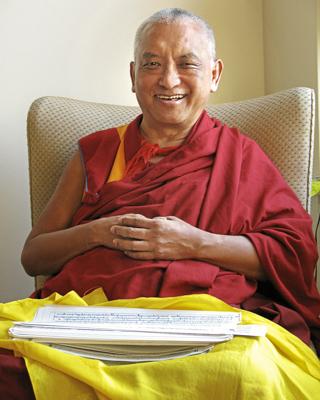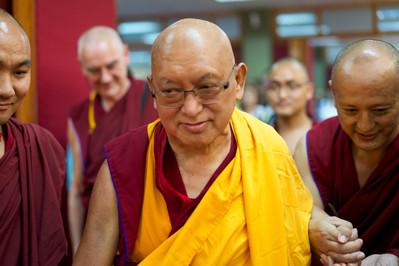Various Transitions

Making Life Decisions that Benefit Others
A monk who had just disrobed asked for advice on whether to live with a woman he had met, who had two children. He also had his own children and a wife from before he was ordained.

It’s a complicated matter. Your wife may count on being with you again. This other woman might have another partner, even though she wants to be with you, and you may cause great suffering to the other man.
The way to make a decision here is by seeing which course of action brings the least harm to other beings. Make your life decisions on that basis. Otherwise, it’s very complicated. Let go of your self and make your decisions on the basis of cherishing others, by thinking how to bring about the most happiness for others. This way of making decisions is very clear and uncomplicated. It’s very healthy and also pure. No ego is involved when one makes one’s life decisions simply based on the thought of the happiness of others.
First, it’s clear that you should make whatever decision brings the most benefit to others. You can also analyze what would bring happiness to the greatest number of other sentient beings. Then choose that. There can also be cases where decisions should be based on which course of action brings deeper benefit or greater benefits.
These are all ways to bring objectivity into our decision-making process. Otherwise, life is a big confusion, and unskillful decisions can bring many problems and suffering to oneself and to others.
But, in worldly life, one decision will upset one person, another will upset another person. It’s always like that. In samsara, whichever way your decision takes you, there’s always somebody you can upset. If you stay with one person, someone else gets upset and jealous. If you stay with the other person, then the first gets upset and jealous.
In any case, enjoy your life in Dharma. Here, there’s no choice. Whatever your lifestyle, you have to practice Dharma.
Tired of Working for Others
A young Californian woman had grown tired of working for others, and wrote to Rinpoche saying she wanted to go back to school.
My very dear Janine,
Thank you very much for your kind letter.
Even if you are at university, you still have to work under people or with people. Working under someone is not necessarily a negative thing. The main thing is if you are able to make your life beneficial for sentient beings and therefore for yourself.
Whether or not you are working under someone is not the problem. If you don’t have the aim to benefit sentient beings, then you miss the goal of your whole life. Even though you think you have a goal, the goal is not good. It is very limited or not a good goal, and that’s always a problem. The problem is you have a goal, but it is not a beneficial goal.
I will pray that your life will be beneficial for sentient beings.
With much love and prayers...
Celebrating a Birthday
Rinpoche offered these suggestions for celebrating one’s birthday.
One way to celebrate a birthday is as if you have just been in a place where there’s great danger. You might not have survived, but you have. That’s a miracle. It’s amazing that since the last birthday, over this past year, you did not die. It is miraculous, a surprise that you have survived since birth, and that is something to celebrate. One can think like that.
Then, you can think that you have done many good things, created the cause of enlightenment, and did not die. You created many causes for liberation from samsara, many causes to achieve a good rebirth in your next life, and have done many things to benefit other sentient beings. These things are worth celebrating. These are the real reasons to celebrate a birthday.
If your life has been spent on meaningless or non-virtuous activities, just to achieve your own happiness for this life, then there’s nothing in which to rejoice. If you are going to live that way, there is no point in celebrating the future. There is nothing to celebrate if your life has been like that in the past, either. But realizing that, and determining that from now on, you will purify past negative actions and change your actions, then you can celebrate. So, on your birthday, you decide to develop compassion and more loving kindness to other living beings—that means all sentient beings, including enemies, not just having love and compassion toward those you like or those who like you.
Imitate the Buddha’s holy deeds, and the life stories of others—not only Buddhists— who tamed their own minds, subdued their egos, and only thought of cherishing others. Aspire to become like those with compassion and loving kindness, renunciation, without anger, who practice tolerance and contentment and have brought so much peace and happiness to many sentient beings, and benefit many people.
If you generate that sort of wish, then you can become like those great holy beings, who are the leaders, the givers of peace and happiness to numberless sentient beings. Then a birthday really becomes something to celebrate.

